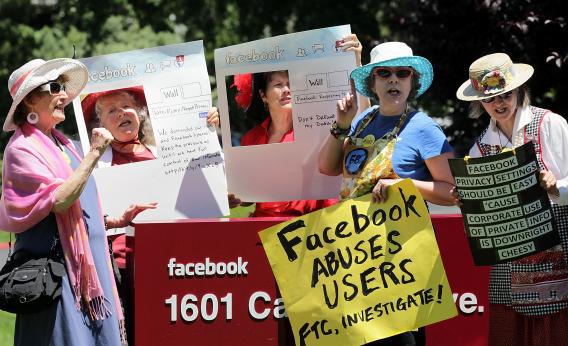One big reason why Americans aren’t that outraged by the revelations that the U.S. government runs a massive online and cellphone spying operation: People already assume they’re being tracked all over the Internet by companies like Google and Facebook.
Yesterday’s Washington Post/Pew poll showed that 56 percent of Americans view the NSA’s snooping as “acceptable,” while 45 percent think it should be allowed to go even further. Contrast that with a 2012 AP-CNBC poll that found only 13 percent of Americans trust Facebook to keep their data private, while another 28 percent trust the company “somewhat.” The majority had little to no faith in the company to protect their privacy.
The numbers aren’t perfectly parallel. But they suggest that the average American is more comfortable with the government’s spying than with Facebook’s control over their personal information.
From a selfish perspective, that makes some sense: Most Americans assume they’ll never be the target of a terror investigation—and that the government has little use for their information otherwise. Facebook, in contrast, relies on the personal information of all of its users. It doesn’t intend to prosecute them for crimes, of course—just show them personalized advertisements. But for many people, the fear of having an illicit relationship, a racy photo, or personal communications unintentionally revealed to their friends and colleagues is more visceral—and more realistic—than the fear of being wrongly prosecuted for a crime. And whereas most people can appreciate the NSA’s interest in monitoring their communications, they have a harder time seeing the upside to Facebook’s data collection. It’s not like Mark Zuckerberg is going to use their old status updates to prevent the next terror attack.
In some ways, perhaps the long-running privacy uproar surrounding Facebook and other Internet companies has paved the way for the public’s acceptance of the NSA’s snooping. They figure the privacy horse is already out of the barn, so why not let the U.S. government hitch a ride with the Googles and Microsofts?
There are some problems with that attitude. For one thing, you can’t opt out of the NSA’s spying program. Leaving the United States would actually make you more susceptible to its snooping. And while Facebook has been rightly criticized for taking its users’ privacy too lightly on many occasions, it actually offers today a fairly robust and surprisingly easy-to-understand range of privacy settings that allow each user to control how her data is shared. The NSA does not and never will, and the more you try to evade its eye, the more its agents are likely to suspect you and single you out for further privacy invasions.
That’s not to say that Americans shouldn’t tolerate online spying by the NSA—just that we shouldn’t adopt a blasé attitude toward it. The right response to the erosion of Americans’ privacy by both corporations and the government is not to throw up our hands, but to take a more active role in deciding what’s acceptable and what isn’t. That isn’t fun, but it’s necessary. You can start by doing two things right now:
- Review your Facebook privacy settings and decide whether you’re comfortable with what you’re sharing. If not, change them.
- Join the paltry 27 percent of Americans who say they’re following the NSA story closely, and decide whether you’re comfortable with what our government is doing—not only to us but to people around the world who have absolutely no say in what the U.S. government can or can’t do. You can’t change those settings, but you can at least advocate for change if you think they could use some adjustments.
The biggest threat to privacy is neither Facebook nor the NSA. It’s our own apathy.
